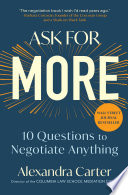

One of the central themes of 'Ask for More' is the transformative power of asking effectively. The author emphasizes that asking is not merely about making requests; it is about understanding the dynamics of communication and negotiation. Effective asking can lead to better outcomes in both personal and professional settings. The book outlines various strategies for crafting requests that are clear, compelling, and considerate of the other party's perspective. By mastering the art of asking, individuals can unlock opportunities, foster collaboration, and build stronger relationships. The author provides practical examples and exercises to help readers practice their asking skills, reinforcing the idea that asking is a skill that can be developed over time.
Continue readingA key concept in 'Ask for More' is the idea of value exchange. The author argues that every request should be framed within the context of mutual benefit. Understanding what the other party values and how your request can align with their interests is crucial for successful negotiations. The book encourages readers to engage in active listening and to ask questions that reveal the other person's needs and motivations. By doing so, individuals can create win-win scenarios that not only fulfill their own needs but also provide value to others. This perspective shifts the paradigm from a transactional approach to a relational one, fostering long-term connections and collaborations.
Continue readingConfidence plays a significant role in the effectiveness of asking. The author discusses how self-assurance can influence outcomes and perceptions in negotiations. When individuals approach requests with confidence, they are more likely to be taken seriously and to receive favorable responses. However, the book also addresses the importance of balancing confidence with humility. Overconfidence can lead to unrealistic expectations and potential backlash. The author provides strategies for building confidence, such as preparation, practice, and positive self-talk. By cultivating a confident mindset, individuals can enhance their ability to ask for what they want and navigate challenging conversations.
Continue readingThe book redefines negotiation as a collaborative process rather than a competitive one. The author argues that effective negotiation involves working together to find solutions that satisfy both parties' needs. This approach contrasts with the traditional view of negotiation as a zero-sum game, where one party's gain is another's loss. The book emphasizes the importance of empathy, respect, and open communication in negotiations. By fostering a collaborative environment, individuals can create a sense of partnership that leads to more innovative and satisfactory outcomes. The author provides frameworks and techniques for facilitating collaborative negotiations, encouraging readers to rethink their approach to conflict resolution.
Continue readingPersistence is highlighted as a crucial quality for successful asking and negotiation. The author shares stories and examples of individuals who faced rejection but continued to pursue their goals through persistence. The book teaches that setbacks are a natural part of the asking process, and resilience can lead to eventual success. It encourages readers to reframe rejection as an opportunity for learning and growth rather than a definitive failure. The author also discusses the importance of timing and adaptability, suggesting that persistence should be coupled with the ability to adjust one's approach based on feedback and circumstances.
Continue readingThe ability to tell a compelling story is a powerful tool in the asking process. The author explains how narratives can make requests more relatable and persuasive. By framing their requests within a story that resonates with the audience, individuals can capture attention and evoke emotional responses. The book provides guidance on how to structure narratives effectively, including elements such as conflict, resolution, and the stakes involved. This storytelling approach not only enhances the clarity of the request but also engages the listener on a deeper level, making them more inclined to respond positively.
Continue readingFinally, 'Ask for More' emphasizes the importance of continuous learning and adaptation in the art of asking. The author encourages readers to reflect on their experiences, gather feedback, and refine their techniques over time. This mindset of growth is essential for developing effective asking skills. The book suggests that individuals should view each asking opportunity as a chance to learn, regardless of the outcome. By embracing a culture of curiosity and improvement, individuals can enhance their capabilities and become more adept at navigating complex conversations and negotiations.
Continue readingThe reading time for Ask for More depends on the reader's pace. However, this concise book summary covers the 7 key ideas from Ask for More, allowing you to quickly understand the main concepts, insights, and practical applications in around 20 min.
Ask for More is definitely worth reading. The book covers essential topics including The Power of Asking, Understanding Value Exchange, The Role of Confidence, providing practical insights and actionable advice. Whether you read the full book or our concise summary, Ask for More delivers valuable knowledge that can help you improve your understanding and apply these concepts in your personal or professional life.
Ask for More was written by Alexandra Carter.
If you enjoyed Ask for More by Alexandra Carter and want to explore similar topics or deepen your understanding, we highly recommend these related book summaries:
These books cover related themes, complementary concepts, and will help you build upon the knowledge gained from Ask for More. Each of these summaries provides concise insights that can further enhance your understanding and practical application of the ideas presented in Ask for More.